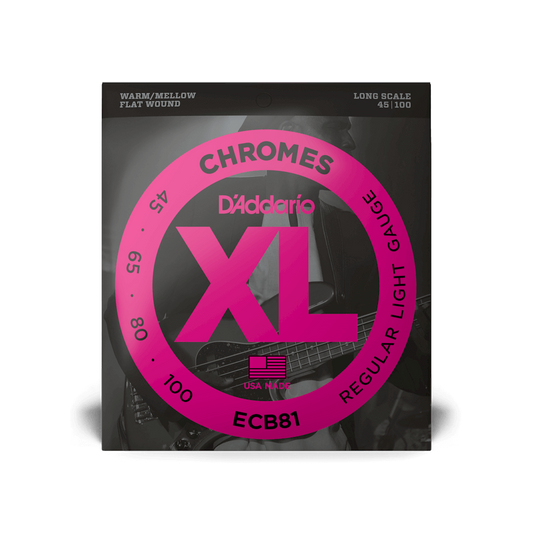-
Rotosound Bass Gtr Strings 35-95 Set RB
Regular price £25.99Regular priceUnit price / per -
Rotosound Jazz Bass Set SM77-F Flatwound
Regular price £56.99Regular priceUnit price / per -
Rotosound Bass Guitar String Set Short RS66S Swing
Regular price £30.99Regular priceUnit price / per -
Rotosound Bass Gtr Strings RS66LD Swing
Regular price £30.99Regular priceUnit price / per -
Ernie Ball Flats Bass Group 2.5 45-105
Regular price £79.99Regular priceUnit price / per -
Roto Bass Tru Bass 65-115 Black Nylon R
Regular price £56.99Regular priceUnit price / per -
Roto Bass Gtr SBL125
Regular price £13.50Regular priceUnit price / per -
Rotosound Bass Gtr Strings SM66 Swing H
Regular price £30.99Regular priceUnit price / per -
Rotosound Bass Gtr Strings RS66LC Swing
Regular price £30.99Regular priceUnit price / per -
Rotosound Swing Bass Set 50-110 RS66LE*
Regular price £30.99Regular priceUnit price / per -
Rotosound Bass Gtr Strings RB40-5 5 Str
Regular price £31.99Regular priceUnit price / per -
D'Addario Bass EXL190 40-10
Regular price £24.99Regular priceUnit price / per -
Ernie Ball Bass Gtr 5 Super Slinky*
Regular price £35.99Regular priceUnit price / per -
Rotosound Bass Gtr Strings 45-5 5 strin
Regular price £31.99Regular priceUnit price / per -
D'Addario NYXL Bass Single 095 Long
Regular price £11.99Regular priceUnit price / per -
Rotosound Bass Gtr Strings RB50 Heavy
Regular price £25.99Regular priceUnit price / per -
D'Addario Bass Strings ENR72 Half Rounds 50-105
Regular price £53.99Regular priceUnit price / per -
D'Addario Bass Strings FlatWnd 45-100 ECB81
Regular price £57.99Regular priceUnit price / per -
D'Addario NYXL Bass Single 085 Long
Regular price £10.50Regular priceUnit price / per -
DR Neon Blue 5-String Bass Strings
Regular price £69.99Regular priceUnit price / per -
Roto Bass Gtr SBL100 String
Regular price £10.99Regular priceUnit price / per -
Roto Bass Gtr SBL080 String
Regular price £9.99Regular priceUnit price / per -
Roto Bass Gtr SBL130
Regular price £12.99Regular priceUnit price / per -
Roto Bass Gtr SBL035
Regular price £9.99Regular priceUnit price / per
Collection:
Bass guitar strings are the fundamental component of a bass guitar’s tone and play a crucial role in the overall sound. These strings are typically thicker and longer than guitar strings, designed to produce lower frequencies, which are essential for the bass’s role in music. The different types of bass guitar strings vary in materials, construction, and feel, which all contribute to their tonal characteristics and playability.
Here’s an overview of the different types of bass guitar strings:
1. Materials
-
Nickel-Plated Steel: These are the most common type of bass strings. They offer a balanced tone with a good mix of warmth and brightness. Nickel-plated steel strings are typically favored by players looking for versatility and are popular in rock, blues, and jazz.
-
Stainless Steel: Known for their bright, punchy sound, stainless steel strings are more durable and have a higher tension than nickel-plated strings. They tend to emphasize the higher end of the frequency spectrum, producing a crisp and cutting sound. These are favored by players who want clarity and brightness.
-
Pure Nickel: These strings are warmer and smoother compared to nickel-plated steel. They produce a vintage-style sound with less brightness, often preferred by those who enjoy classic rock, blues, or other styles that require a more mellow tone.
-
Coated Strings: Coated bass strings are wrapped in a layer of polymer that helps to protect the metal from corrosion, extending the life of the strings. They have a smoother feel and slightly different tonal characteristics—typically warmer and rounder with less brightness.
2. Types Based on Winding
-
Roundwound Strings: These are the most common type of bass strings, featuring a round wire wound around the core of the string. They offer a bright, punchy tone with a lot of sustain and are ideal for most genres, including rock, funk, and pop. The texture of roundwound strings can feel rougher and can lead to more finger noise.
-
Flatwound Strings: Flatwound strings have a smooth, flat wire wound around the core, which gives them a more mellow, vintage tone with less sustain. The feel is smoother and more comfortable, making them popular for jazz and classic rock styles. They also produce less finger noise and are easier on the fingers.
-
Halfwound (or Groundwound) Strings: These are a hybrid between roundwound and flatwound strings. They are roundwound strings that have been ground or polished down to create a smoother surface. They retain the brightness of roundwound strings but have less of the harshness and finger noise. These strings are great for players seeking a balanced sound.
3. Tuning and Gauge
-
Standard vs. Extended Range: While most bass guitars are tuned in standard E-A-D-G (the four main strings), there are basses that use extended tunings, such as 5-string or 6-string basses, where additional strings are tuned to lower or higher notes. The strings for these instruments are specifically designed for the extended range.
-
String Gauge: String gauge refers to the thickness of the strings. Lighter gauge strings (e.g., 40-95) are easier to play and bend but provide less sustain and a thinner tone. Heavier gauge strings (e.g., 45-105, 50-110) produce a fuller, richer tone but require more finger strength and effort to play.
4. Coated vs. Uncoated
-
Coated Strings: As mentioned, coated bass strings have a protective layer to prolong their lifespan and reduce wear. They can offer a smoother feel and less buildup of dirt and grime, but they sometimes sacrifice some brightness in tone.
-
Uncoated Strings: These tend to have a more vibrant and brighter tone, but they may wear out more quickly and are more susceptible to corrosion from moisture and oils on the fingers.
Conclusion
Bass guitar strings come in many varieties to cater to different musical styles and player preferences. Whether you're after a vintage warmth (pure nickel), bright punch (stainless steel), or a smooth, mellow tone (flatwound), there’s a string type that suits your needs. Additionally, considerations like string gauge and coating will influence your overall playing experience and sound.

















